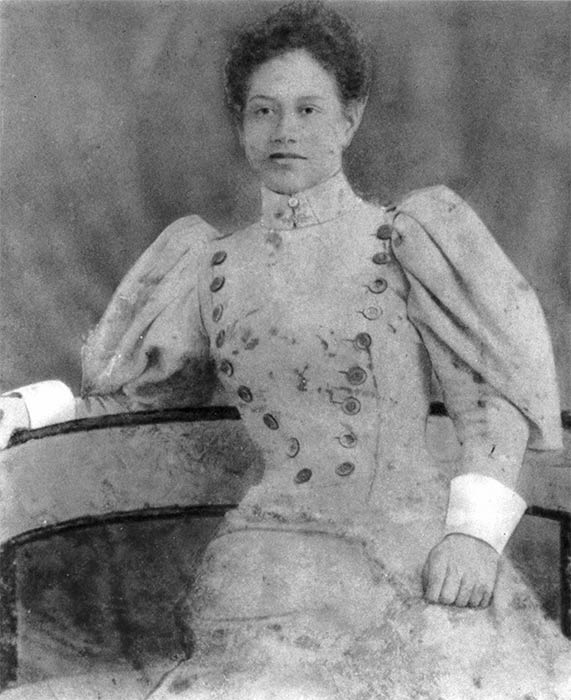
Meri Te Tai Mangakāhia (1868–1920)
Te Rarawa, Ngāti Te Teinga, Ngāti Manawa, Te Kaitutae.
Meri Te Tai Mangakāhia was a prominent and influential Māori woman activist in the 1890s. She was well-educated and married to Hāmiora Mangakāhia, the first Premier of the Kotahitanga Māori parliament which first met in 1892. Meri made the most of her connections and social position to advance women’s rights. In 1893 she was involved in establishing Ngā Kōmiti Wāhine, committees associated with the Kotahitanga parliament. These addressed issues confronting Māori women and their whānau. Domestic violence, smoking, alcoholism, religion, single mothers and the retention of traditional skills were all on the agenda. [1]
One of Meri’s most notorious acts was to present a motion at a Kotahitanga meeting in Hawke’s Bay requesting that women vote and participate in the selection of members. She personally addressed the parliament on the motion – the first woman known to have done so. This is a transcript of her words, followed by an English translation:
E whakamoemiti atu ana ahau kinga honore mema e noho nei, kia ora koutou katoa, ko te take i motini atu ai ahau, ki te Tumuaki Honore, me nga mema honore, ka mahia he ture e tenei whare kia whakamana nga wahine ki te pooti mema mo ratou ki te Paremata Maori.
1. He nui nga wahine o Nui Tireni kua mate a ratou taane, a he whenua karati, papatupu o ratou.
2. He nui nga wahine o Nui Tireni kua mate o ratou matua, kaore o ratou tungane, he karati, he papatupu o ratou.
3. He nui nga wahine mohio o Nui Tireni kei te moe tane, kaore nga tane e mohio ki te whakahaere i o raua whenua.
4. He nui nga wahine kua koroheketia o ratou matua, he wahine mohio, he karati, he papatupu o ratou.
5. He nui nga tane Rangatira o te motu nei kua inoi ki te kuini, mo nga mate e pa ara kia tatou, a kaore tonu tatou i pa ki te ora i runga i ta ratou inoitanga. Na reira ka inoi ahau ki tenei whare kia tu he mema wahine.
Ma tenei pea e tika ai, a tera ka tika ki te tuku inoi nga mema wahine ki te kuini, mo nga mate kua pa nei kia tatou me o tatou whenua, a tera pea e whakaae mai a te kuini ki te inoi a ona hoa Wahine Maori i te mea he wahine ano hoki a te kuini.
English translation:
I exult the honourable members of this gathering. Greetings.
I move this motion before the principle member and all honourable members so that a law may emerge from this parliament allowing women to vote and women to be accepted as members of the parliament.
Following are my reasons for presenting this motion that women may receive the vote and that there be women members:
1. There are many women who have been widowed and own much land.
2. There are many women whose fathers have died and do not have brothers.
3. There are many women who are knowledgeable of the management of land where their husbands are not.
4. There are many women whose fathers are elderly, who are also knowledgeable of the management of land and own land.
5. There have been many male leaders who have petitioned the Queen concerning the many issues that affect us all, however, we have not yet been adequately compensated according to those petitions. Therefore I pray to this gathering that women members be appointed. Perhaps by this course of action we may be satisfied concerning the many issues affecting us and our land.
Perhaps the Queen may listen to the petitions if they are presented by her Māori sisters, since she is a woman as well. [2]
In 1893 all New Zealand women, Māori and Pakeha, won the right to vote in general elections. It is not known how many Māori women signed the suffrage petition, but perhaps around 4000 of them voted in the 1893 election. As Meri’s speech indicates, Maori women had different concerns from those of their Pākehā associates. Pākehā suffragists were focused on moral reform and temperance (restriction of alcohol). While Māori women were also concerned about alcohol abuse, and many became members of the Women’s Christian Temperance Union (WCTU), they were more concerned about the overall wellbeing of Māori culture. The need to counter the effects of colonisation, particularly land loss and the lack of recognition of Māori women’s rights as the owners of land and resources, was another key motivation. Some Māori women of mana were accustomed to having decision-making power over men, whereas Pākehā women had long endured patriarchal domination. Even so, Māori women did not win the right to vote in Kotahitanga elections until 1897. The Kotahitanga parliament met for the last time in 1902.
Meri Te Tai Mangakāhia continued to be active in Māori politics and welfare. In partnership with Niniwa i te Rangi of Wairarapa, she started a column named Te Reiri Karamu (‘The Ladies’ Column’) which was published in Te Tiupiri (The Jubilee). Letters and articles published in Te Tiupiri and other Māori newspapers are indicative of robust intellectual debate and show that Māori women were highly engaged in issues of women’s rights in the late 19th century and beyond.
See also the entry on Meri Te Tai Māngakahia in the Dictionary of New Zealand Biography.
[1] Tania Rei, Maori women and the vote, Huia Publishers, Wellington, 1993, p. 19.
[2] Adapted from a translation by Charles Royal in Charlotte Macdonald, Merimeri Penfold and Bridget Williams (eds), The book of New Zealand women Ko kui ma te kaupapa, Bridget Williams Books, Wellington, 1991, p. 413.


Community contributions